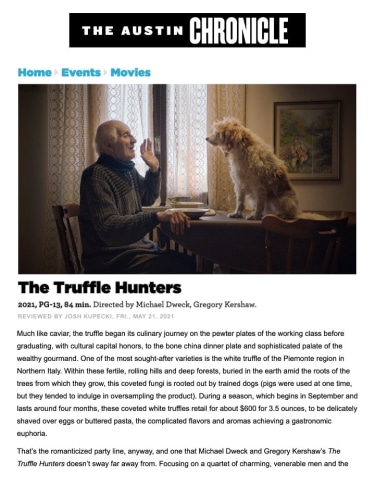The Truffle Hunters
Austin Chronicle
05/21/2021
Back
Reviewed by Josh Kupecki
Much like caviar, the truffle began its culinary journey on the pewter plates of the working class before graduating, with cultural capital honors, to the bone china dinner plate and sophisticated palate of the wealthy gourmand. One of the most sought-after varieties is the white truffle of the Piemonte region in Northern Italy. Within these fertile, rolling hills and deep forests, buried in the earth amid the roots of the trees from which they grow, this coveted fungi is rooted out by trained dogs (pigs were used at one time, but they tended to indulge in oversampling the product). During a season, which begins in September and lasts around four months, these coveted white truffles retail for about $600 for 3.5 ounces, to be delicately shaved over eggs or buttered pasta, the complicated flavors and aromas achieving a gastronomic euphoria.
That’s the romanticized party line, anyway, and one that Michael Dweck and Gregory Kershaw’s The Truffle Hunters doesn’t sway far away from. Focusing on a quartet of charming, venerable men and the dogs they love, the film offers an engaging portrait of life in the truffle hunting trade, a bucolic life spent roaming picturesque forests, maintaining the winter wood heaters, and drinking wine. And for irascible Angelo, pecking furiously (and erratically) on his typewriter. Angelo has given up the hunt. Things have changed too much, people have no respect for tradition, greed and trespassing have cast a shadow over the industry. A common lament, as another hunter Sergio discusses efforts of sabotage by competitors, including puncturing tires and poisoning bait for the dogs. A concern for Aurielo is what to do with his beloved dog Birba. An elderly bachelor, Aurielo wants to find a good home for Birba after he passes. Mortality also figures in with Carlo’s plight, as his late night truffle expeditions with his dog Titina, are drawing the increasing ire of his wife. She, quite sensibly, doesn’t want her ageing husband wandering around the woods at night, and a minor scrape that sends Carlo to the doctor’s office proves her point.
And then there are the buyers. The brokers who act as the middlemen between the hunters and the clients (the restaurants, the royalty). Since it’s a free market economy, back alley transactions and black market deals are par for the course. Dweck and Kershaw capture this fascinating subculture with beautifully composed frames, and the music by Ed Côrtes is suitably infused with musette accordions. But while the eccentric personalities on display here exude a humorous sweetness, it is (naturally) the four-legged frontline truffle hunters that steal the film. And while I don’t have a strong desire to sample the haute cuisine of white truffles, I do have an intense compulsion to wander around the countryside with Fiona, Titina, and Birba. Especially Birba.
***1/2